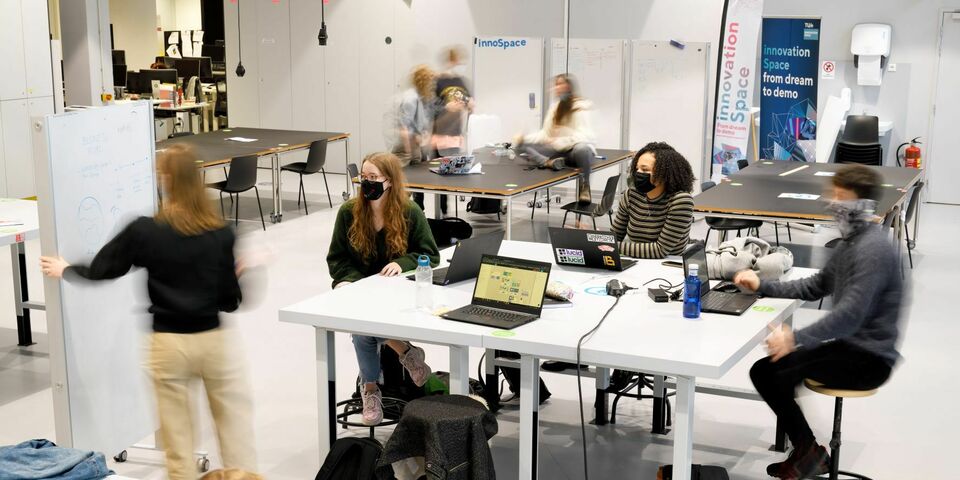Bachelor College 2.0 ends compulsory basic courses
In the 'fine design' of the reform plans for the Bachelor College the decision whether basic courses will be part of a department's core program lies with the department itself. An important role is given to challenge-based learning. Yesterday the plans were on the agenda of the University Council meeting, and a positive advise was issued, albeit it with nine reservations. The fine design will be worked out in greater detail over the next three months.
One deadline already stands: in eighteen months' time, in September 2023, Bachelor College 2.0 will be launched. A great many changes have been made to the refined version of the reform plans, which arose from the first broad version presented back in September. For example, it has now been decided that the departments themselves may choose which basic courses they will include in their core program. The stated reasoning for this is to maximize the cohesion between the basic courses and the major. This brings to an end the requirement that all bachelor's students follow five basic courses in their first year. In the ‘broad’ version dating from September this was still on the table. At that stage the discussion still centered on the proposal that all the basic courses should be taken in the first semester.
Still in three versions, the basic course Calculus remains and will continue to be taught to all students in the first three months of their program. The plan is now to take stock of what else could and should be added to the core programs run by the departments. Candidates are the courses Linear Algebra, Statistics and Advanced Algebra, and courses on programming, physical sciences and data analysis. Lecturers from various departments will set about further elaborating these components.
CBL
Challenge-Based Learning, the new educational concept that TU/e has been working on for some time, takes on an important role in the new Bachelor College. This is not unexpected. All bachelor's programs will include a CBL curriculum line with clearly recognizable characteristics. This means working on open-ended project challenges, employing self-regulated learning and systems thinking. And doing so in an iterative manner, in other words using feedback and new information to repeatedly refine and improve a solution to a project challenge. In the first eighteen months of their program, students will be taught basic CBL skills, after which in the second half of the second year they will tackle a multidisciplinary project problem in a team comprising students of two or more departments.
Then in the third year of their bachelor's, students may choose to continue on the CBL curriculum line by joining interdisciplinary CBL projects within the timetabling scope provided for electives.
Ongoing discussion
The personal and professional development of students within the Bachelor College is a topic on which discussion is ongoing, the fine design reveals. This aspect will be finalized in the coming months, meeting the requirements that it must fit within the degree programs and that it can be defined by learning outcomes. Self-study and the development of a professional identity must also be fostered, in part with the assistance of mentors, tutors, coaches and study advisors. It should be noted that after the launch in September 2023, this component will be further refined in subsequent years.
Similarly, the programming and content of the USE program (User, Society, Entrepreneurship) is currently being examined and discussed. A special working group has studied this component and issued its advice. Much is currently undecided, but a connection between any USE course and the major is a prerequisite. The extent to which industrial experts can be involved in the USE program is also being investigated. They can bring cases that link a particular discipline to professional working practice.
With the various components in need of elaboration divided into work packages, working groups will finalize them in the coming months. This phase will be completed at the end of May, and the schedule states that the fully elaborated new model will be submitted on June 20th to the University Council for approval. This will then mark the start of preparations for the introduction of Bachelor College 2.0 in the academic year 2023-2024.
Reservations
The University Council took the step of appending a long list of conditions to yesterday's positive advice. Among other things, these relate to improving internal communication about the plans, at both university and departmental level. The University Council is also keen for components still in development or likely to be postponed to be looked at properly. These must not jeopardize the productivity of degree programs.
Another of the council's concerns regards sustainability as a theme within degree programs, and the council urgently requests that this be allowed to play an important role within the new Bachelor College. This is something the dean of the Bachelor College and the Executive Board have promised to actively pursue. On March 29th, a brainstorming session organized by BC Dean Ines Lopez Arteaga will be held to illuminate this issue.
In addition, the council asks that a rough estimate be made of the cost involved in this operation and the number of people needed to implement it. Another important point for the council is just how much elective freedom students will maintain in the new Bachelor College. Will it still be possible to switch in the first year, the advice asks. After all, when the Bachelor College was launched in 2012, this freedom of choice played an important role in drawing prospective students to Eindhoven, the council notes.
Thursday February 24th Cursor will be talking with Dean Ines Lopez Arteaga about how the reform process has gone so far and about her expectations for the coming months as the plans are worked out in greater detail.


Discussion